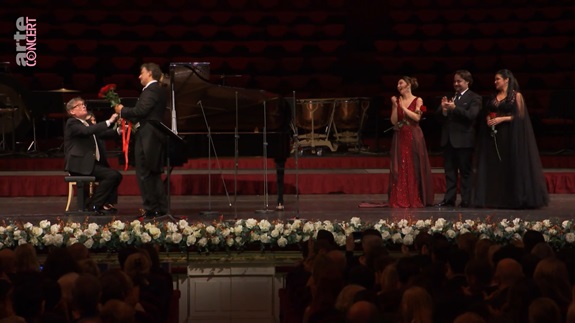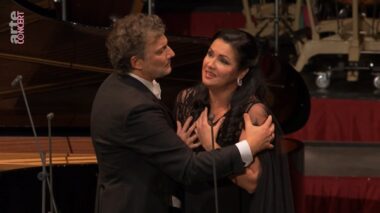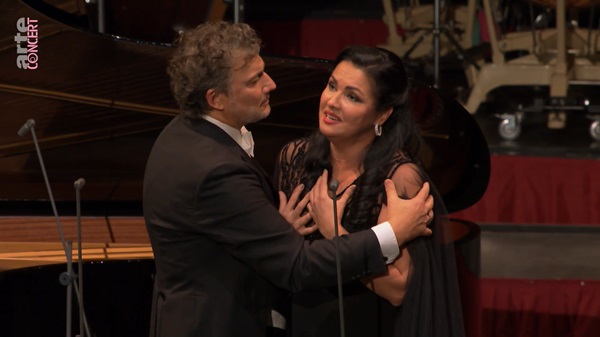 Italy La Scala per Puccini: Jonas Kaufmann, Luciano Ganci (tenors), Anna Netrebko, Mariangela Sicilia (soprano), James Vaughan (piano). Filmed (directed by Stefania Grimaldi) at La Scala, Milan, 29.11.2024 and available on ARTE Concert until 28.3.2025. (JPr)
Italy La Scala per Puccini: Jonas Kaufmann, Luciano Ganci (tenors), Anna Netrebko, Mariangela Sicilia (soprano), James Vaughan (piano). Filmed (directed by Stefania Grimaldi) at La Scala, Milan, 29.11.2024 and available on ARTE Concert until 28.3.2025. (JPr)

I am happy to acknowledge reading about the background to this recital on Gramiliano which reveals how ‘The concert, long sold out, with the orchestra and chorus of La Scala, Riccardo Chailly conducting and the singers Anna Netrebko, Jonas Kaufmann and Mariangela Sicilia was to be recorded for television, exactly 100 years after the composer died in Brussels, on 29 November 1924.
La Scala is known for starting punctually, leaving late spectators in the foyer until an interval, yet 8pm passed and the musicians and chorus still hadn’t entered the stage.
[The day before] there was a General Strike in Italy affecting transport, schools and so on, but many activities went on even so. Five minutes after the due start time, the theatre’s director, Dominique Meyer, came out on stage explaining that La Scala didn’t know who in the orchestra was striking and only five minutes before the start it had become clear that the concert could not go ahead.
“If you allow me a few minutes,” said Meyer, “La Scala will offer you a glass of Bellavista and will arrange another concert.”
While sparkling wine was drunk in the foyer, orchestral music stands were removed and a piano was wheeled on stage.’
So, while respecting the orchestra’s right to strike, for the audience who had turned up at La Scala – and even though they would have the money for their tickets reimbursed – this recital was presented and became available on ARTE Concert before Christmas and is available until 28 March 2025.
Irish pianist James Vaughan is on the music staff of La Scala and accompanied tenors Jonas Kaufmann and Luciano Ganci, and sopranos Anna Netrebko and Mariangela Sicilia in their Puccini tribute. I have no idea what possible preparatory work had gone into this replacement programme but it – by design, or merely accident – had a theme of farewell or characters reminiscing or bemoaning their fate, which was entirely appropriate for the anniversary of Puccini’s premature death.
It all began with ‘Addio, mio dolce amor!’ (‘Farewell, farewell my sweet love!’) from the composer’s 1889 Edgar. This introduced me to Mariangela Sicilia who impressed throughout with her gorgeous lyric soprano voice, with its impeccable vocal technique and especially exquisite floated high notes, as well as an assured presence on the concert platform. She excelled as a very appealing Mimì, plaintive Liù and in her soaring ‘O mio babbino caro’, lustrous ‘Doretta’s Song’ from Puccini’s 1920 La rondine and a tender song, ‘Sogno d’or’ (‘Sweet dream’). The latter is something of a lullaby, which though composed in 1912, actually found its way into the wonderful quartet in the second act of La rondine.
Another great discovery was tenor Luciano Ganci, making we wonder why we do not hear Italian singers like Ganci and Sicilia in Italian opera at Covent Garden? Ganci had a dramatic voice with a clarion ring to it and his renditions of ‘Torna ai felici dì’ (Le villi) and ‘Addio fiorito asil’ (Madama Butterfly) were suitably remorseful and heart-wrenching.

Anna Netrebko and Jonas Kaufmann are known quantities and are currently singing as well as ever. Their Act IV from Manon Lescaut with James Vaughan – who was a sensitive accompanist throughout the short programme – doing his best to generate some of the heat of the swamps of New Orleans (or Puccini’s desert!) in the opera house. Kaufmann sounded burnished and ardent and Netrebko’s voice, though slow to warm up to her expressive best, climaxed her performance with an intensely felt, harrowing ‘Sola, perduta, abbandonata’ (‘Alone, lost, abandoned’).
Joining Sicilia, Kaufmann’s familiar baritonal voice soared in ‘O soave fanciulla’ (La bohème) and brought great emotional depth to the sadness – and inherent defiance – of ‘Ch’ella mi creda’ (La fanciulla del West) and ‘E lucevan le stelle’ (Tosca) along with sterling, though hard-won, top notes. Kaufmann ended with the best ‘Nessun dorma’ (Turandot) I have heard from him ending with a ringing ‘Vincerò!’ before a shouted ‘Viva Puccini!’ during the standing ovation the singers and James Vaughan richly deserved.
Indeed, ‘Long live Puccini!’
Jim Pritchard
Programme:
(Edgar) ‘Addio, mio dolce amor!’ (MS)
(Le villi) ‘Torna ai felici dì’ (LG)
(La bohème) ‘Sì. Mi chiamano Mimì’ (JK, MS)
(La bohème) ‘O soave fanciulla’ (JK, MS)
(Madama Butterfly) ‘Addio fiorito asil’ (LG)
(La rondine) ‘Chi il bel sogno di Doretta’ (MS)
(La fanciulla del West) ‘Ch’ella mi creda’ (JK)
(Gianni Schicchi) ‘O mio babbino caro’ (MS)
(Manon Lescaut) Fourth act (JK, AN)
(Turandot) ‘Tu che di gel sei cinta’ (MS)
(Tosca) ‘E lucevan le stelle’ (JK)
‘Sogno d’or’ (JK)
(Turandot) ‘Nessun dorma’ (JK)

Thanks for report and review.
I feel compelled to add a few words to the ]sudden strike’: it soon was obvious, that the rehearsal in the morning could not take place too because of the strike!!! So Mr. Meyer was warned and had time to prepare a new program together with the singers!
Manon Lescaut: the Louisiana desert is not a mistake, as often mentioned; in the time when the story is placed (early eighteenth century) Louisiana was part of Texas and Texas has deserts………
Jim for S&H replies: Thank you very much for this. Nevertheless there is no desert near New Orleans where the ship sailed to I believe! For ‘desert’ Puccini might have meant wasteland, regardless it is unlikely, I understand, they would have trouble finding water near New Orleans.